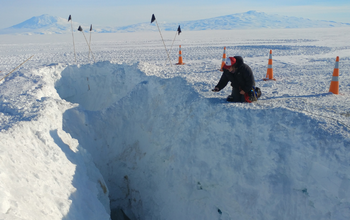The ACORN series is a monthly online seminar series by PerCS-Net members on topics related to Arctic coastal research. Talks are scheduled for the 4th Wednesday of the month at 1 pm Eastern Time.
On 22 March 2023, David Nielsen, Postdoc, Ocean Biogeochemistry Group, at the Max Planck Institute for Meteorology in Hamburg, Germany will give a talk on Modeling Coastal Erosion Impacts on Ocean C02 Uptake.
Abstract
How could coastal erosion change the Arctic Ocean's uptake of atmospheric CO2 in the future? - an Earth system modelling perspective.
Coastal erosion releases organic matter (OM) from the permafrost into the Arctic Ocean, transporting about 5 to 15 Tg (mega tons) of organic carbon every year. Recent projections show that such rates could increase by a factor of 2 to 3 by the end of the century due to anthropogenic climate change. However, the impact of the increasing coastal permafrost erosion on the Arctic Ocean's uptake of atmospheric CO, is unknown. Especially under difference future emission scenarios, how could coastal erosion change the Arctic Ocean's uptake of atmospheric CO,? This question is particularly difficult because, once eroded, the OM may take several different pathways. It could 1) be remineralized onshore or in the ocean, producing COz, 2) boost primary production, consuming CO2, or 3) sink and be buried in the ocean bottom sediment, having little immediate effect on surface CO,. Here, we represent OM fluxes from coastal erosion into the Arctic Ocean in the Max Planck Institute Earth System Model (MPI-ESM and investigate the ocean's biogeochemistry response. We run a set of 8 sensitivity simulations varying permafrost OM characteristics, covering the historical period (1850-2014) and 3 future scenarios (2015-2100) from the Coupled Model Intercomparison Project (CMIP) phase 6. In all scenarios and sensitivity simulations, coastal permafrost erosion reduces the Arctic Ocean's atmospheric CO, uptake by 1 to 2 T9C/year per degree of increase in global mean surface temperature. The yearly sink of atmospheric CO, into the Arctic Ocean could thus be reduced by about 10% to 20%, depending on scenario and, mostly, on OM characteristics. While all simulations robustly show a decrease in the oceanic CO, uptake, the magnitude of such decrease is highly sensitive to the representation of OM in our model (i.e. C/N ratio and particulate-dissolved fractions). Despite large uncertainties, our work highlights the relevance of coastal permafrost erosion to the Arctic carbon cycle, and thereby the need for considering such fluxes in Earth system model simulations.

